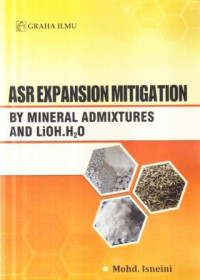Text
ASR expansion mitigation by mineral admixtures and LiOH.H2O
Nowadays, concrete deterioration has become a major problem throughout the world. One of the actors that contribute to the deterioration of concrete is Alkali-silica reaction (ASR). ASR will occur when these components such as reactive silica, alkalis, and sufficient moisture are present in concrete (ACI 221.1R-98). Several ways have been applied to control or even stop ASR in concrete: such as utilization blended cement, cement with low alkali content, innocuous aggregate, control of total alkali in concrete. Currently, it is generally accepted that supplementary cementitious materials (SCMs) such as fly ash (FA), silica fume (SF), blast furnast slag (BFS), are typical SCMs used in concrete. SCMs have been used spreadly and successfully to mitigate ASR. This experimental program was carried out in the laboratory to investigate the effectiveness of mineral and chemical admixtures in order to reduce expansion. The production of mortars and concrete are included in this study. The pessimum proportion of aggregate is determined when reactive and non reactive aggregates were mixed with the ratio of 30:70. Concrete prisms were made according to RILEM AAR-3, and mortar prism were made based on JIS A 1146. Concrete specimens were cured under 40°C, and R.H. 100% for expansion test. Meanwhile, mortar specimens were also treated under 40°C, and R.H. 100% for expansion measurement.
Ketersediaan
Informasi Detail
- Judul Seri
-
-
- No. Panggil
-
628.1 Isn s
- Penerbit
- Yogyakarta : Graha Ilmu., 2016
- Deskripsi Fisik
-
xxiv, 140 hal. ; il. ; 24 cm.
- Bahasa
-
English
- ISBN/ISSN
-
9786022625759
- Klasifikasi
-
628.1
- Tipe Isi
-
-
- Tipe Media
-
-
- Tipe Pembawa
-
-
- Edisi
-
Ed. I
- Subjek
- Info Detail Spesifik
-
-
- Pernyataan Tanggungjawab
-
-
Versi lain/terkait
Tidak tersedia versi lain
Lampiran Berkas
Komentar
Anda harus masuk sebelum memberikan komentar

 Karya Umum
Karya Umum  Filsafat
Filsafat  Agama
Agama  Ilmu-ilmu Sosial
Ilmu-ilmu Sosial  Bahasa
Bahasa  Ilmu-ilmu Murni
Ilmu-ilmu Murni  Ilmu-ilmu Terapan
Ilmu-ilmu Terapan  Kesenian, Hiburan, dan Olahraga
Kesenian, Hiburan, dan Olahraga  Kesusastraan
Kesusastraan  Geografi dan Sejarah
Geografi dan Sejarah